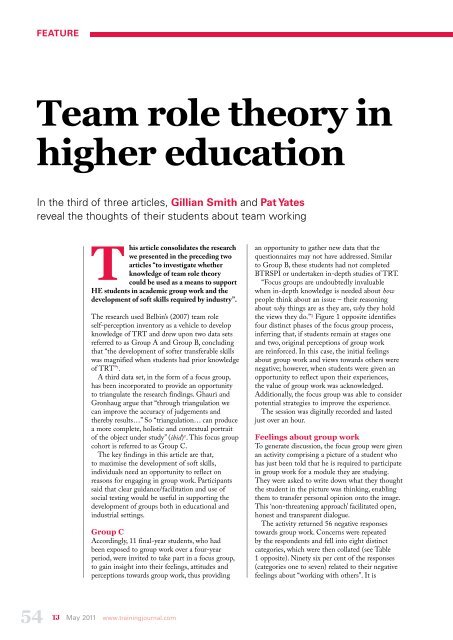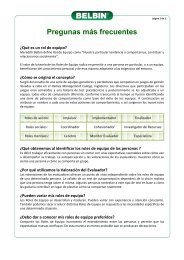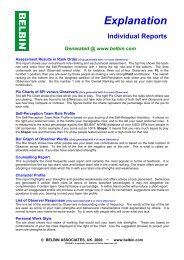Part 3 - Team Role Theory in Higher Education - Belbin
Part 3 - Team Role Theory in Higher Education - Belbin
Part 3 - Team Role Theory in Higher Education - Belbin
Create successful ePaper yourself
Turn your PDF publications into a flip-book with our unique Google optimized e-Paper software.
Feature<br />
<strong>Team</strong> role theory <strong>in</strong><br />
higher education<br />
In the third of three articles, Gillian Smith and Pat Yates<br />
reveal the thoughts of their students about team work<strong>in</strong>g<br />
This article consolidates the research<br />
we presented <strong>in</strong> the preced<strong>in</strong>g two<br />
articles “to <strong>in</strong>vestigate whether<br />
knowledge of team role theory<br />
could be used as a means to support<br />
HE students <strong>in</strong> academic group work and the<br />
development of soft skills required by <strong>in</strong>dustry”.<br />
The research used Belb<strong>in</strong>’s (2007) team role<br />
self-perception <strong>in</strong>ventory as a vehicle to develop<br />
knowledge of TRT and drew upon two data sets<br />
referred to as Group A and Group B, conclud<strong>in</strong>g<br />
that “the development of softer transferable skills<br />
was magnified when students had prior knowledge<br />
of TRT” 1 .<br />
A third data set, <strong>in</strong> the form of a focus group,<br />
has been <strong>in</strong>corporated to provide an opportunity<br />
to triangulate the research f<strong>in</strong>d<strong>in</strong>gs. Ghauri and<br />
Gronhaug argue that “through triangulation we<br />
can improve the accuracy of judgements and<br />
thereby results…” So “triangulation… can produce<br />
a more complete, holistic and contextual portrait<br />
of the object under study” (ibid) 2 . This focus group<br />
cohort is referred to as Group C.<br />
The key f<strong>in</strong>d<strong>in</strong>gs <strong>in</strong> this article are that,<br />
to maximise the development of soft skills,<br />
<strong>in</strong>dividuals need an opportunity to reflect on<br />
reasons for engag<strong>in</strong>g <strong>in</strong> group work. <strong>Part</strong>icipants<br />
said that clear guidance/facilitation and use of<br />
social test<strong>in</strong>g would be useful <strong>in</strong> support<strong>in</strong>g the<br />
development of groups both <strong>in</strong> educational and<br />
<strong>in</strong>dustrial sett<strong>in</strong>gs.<br />
Group C<br />
Accord<strong>in</strong>gly, 11 f<strong>in</strong>al-year students, who had<br />
been exposed to group work over a four-year<br />
period, were <strong>in</strong>vited to take part <strong>in</strong> a focus group,<br />
to ga<strong>in</strong> <strong>in</strong>sight <strong>in</strong>to their feel<strong>in</strong>gs, attitudes and<br />
perceptions towards group work, thus provid<strong>in</strong>g<br />
54 May 2011 www.tra<strong>in</strong><strong>in</strong>gjournal.com<br />
an opportunity to gather new data that the<br />
questionnaires may not have addressed. Similar<br />
to Group B, these students had not completed<br />
BTRSPI or undertaken <strong>in</strong>-depth studies of TRT.<br />
“Focus groups are undoubtedly <strong>in</strong>valuable<br />
when <strong>in</strong>-depth knowledge is needed about how<br />
people th<strong>in</strong>k about an issue – their reason<strong>in</strong>g<br />
about why th<strong>in</strong>gs are as they are, why they hold<br />
the views they do.” 3 Figure 1 opposite identifies<br />
four dist<strong>in</strong>ct phases of the focus group process,<br />
<strong>in</strong>ferr<strong>in</strong>g that, if students rema<strong>in</strong> at stages one<br />
and two, orig<strong>in</strong>al perceptions of group work<br />
are re<strong>in</strong>forced. In this case, the <strong>in</strong>itial feel<strong>in</strong>gs<br />
about group work and views towards others were<br />
negative; however, when students were given an<br />
opportunity to reflect upon their experiences,<br />
the value of group work was acknowledged.<br />
Additionally, the focus group was able to consider<br />
potential strategies to improve the experience.<br />
The session was digitally recorded and lasted<br />
just over an hour.<br />
Feel<strong>in</strong>gs about group work<br />
To generate discussion, the focus group were given<br />
an activity compris<strong>in</strong>g a picture of a student who<br />
has just been told that he is required to participate<br />
<strong>in</strong> group work for a module they are study<strong>in</strong>g.<br />
They were asked to write down what they thought<br />
the student <strong>in</strong> the picture was th<strong>in</strong>k<strong>in</strong>g, enabl<strong>in</strong>g<br />
them to transfer personal op<strong>in</strong>ion onto the image.<br />
This ‘non-threaten<strong>in</strong>g approach’ facilitated open,<br />
honest and transparent dialogue.<br />
The activity returned 56 negative responses<br />
towards group work. Concerns were repeated<br />
by the respondents and fell <strong>in</strong>to eight dist<strong>in</strong>ct<br />
categories, which were then collated (see Table<br />
1 opposite). N<strong>in</strong>ety six per cent of the responses<br />
(categories one to seven) related to their negative<br />
feel<strong>in</strong>gs about “work<strong>in</strong>g with others”. It is
1. Feel<strong>in</strong>gs<br />
about group<br />
work<br />
<strong>in</strong>terest<strong>in</strong>g to note that only 4 per cent of the<br />
responses (category eight) consider <strong>in</strong>dividual<br />
responsibility and effect of self on the group. This<br />
is a clear <strong>in</strong>dication that the <strong>in</strong>itial attitudes and<br />
feel<strong>in</strong>gs towards work<strong>in</strong>g with others, even after a<br />
four-year period of study, were negative.<br />
Table 1 Focus group activity 1<br />
2. Views<br />
towards others<br />
1<br />
Assumption that the standard of<br />
others is <strong>in</strong>ferior to their own<br />
6<br />
2 Not want<strong>in</strong>g to do group work 9<br />
3<br />
Assumption that they will do more<br />
work than others<br />
10<br />
4<br />
Assumption that group work will have<br />
a negative effect on grades<br />
4<br />
5<br />
Assumption that the work ethic of<br />
others is <strong>in</strong>ferior to their own<br />
3<br />
6 Want<strong>in</strong>g to choose own group 9<br />
7<br />
Need for <strong>in</strong>formation about group<br />
work<br />
13<br />
8 Reflect<strong>in</strong>g on own group work activity 2<br />
Total number of responses 56<br />
Negative views towards others<br />
The negative comments made with<strong>in</strong> the focus<br />
group activity were used as a basis for generat<strong>in</strong>g<br />
further discussion to enable deeper exploration of<br />
their attitudes and feel<strong>in</strong>gs. Examples of the k<strong>in</strong>d<br />
of negative comments made <strong>in</strong>clude “oh no”, “not<br />
group work aga<strong>in</strong>”, “I hope we can choose our own<br />
group”, “am I sitt<strong>in</strong>g next to any bright people?”<br />
Interest<strong>in</strong>gly, from the beg<strong>in</strong>n<strong>in</strong>g of the<br />
discussion, the <strong>in</strong>terchange between students<br />
began to establish alternative viewpo<strong>in</strong>ts <strong>in</strong> favour<br />
of group work. This <strong>in</strong>dicated that, although<br />
<strong>in</strong>itial comments were 96 per cent aga<strong>in</strong>st<br />
work<strong>in</strong>g with others, when given an opportunity<br />
to reflect on attitudes and feel<strong>in</strong>gs, this proved not<br />
to be the case. For example, “to try and do that on<br />
your own [group work] would be near impossible,<br />
3. Realisation<br />
of own actions<br />
on others<br />
4. Student recommendations<br />
Fig 1 Focus<br />
group process<br />
I th<strong>in</strong>k… you need people… but it depends on<br />
what group you end up <strong>in</strong>” (UCB focus group<br />
transcript 15.18). Another student commented:<br />
“It generates ideas… but also, if someone is not<br />
pull<strong>in</strong>g their weight, you tend to th<strong>in</strong>k am I really<br />
do<strong>in</strong>g their work for them?” (UCB focus group<br />
transcript 18.12.)<br />
This debate cont<strong>in</strong>ued <strong>in</strong> the same ve<strong>in</strong>, and the<br />
facilitators were able to observe that self-reflection<br />
was enabl<strong>in</strong>g the students to realise that, although<br />
they had negative perceptions of work<strong>in</strong>g with<br />
others, they were acknowledg<strong>in</strong>g that they had<br />
also benefited from group work experiences.<br />
Realisation of own actions on others<br />
As the discussion unfolded, there was a transition<br />
from focus<strong>in</strong>g on work<strong>in</strong>g with others to an<br />
acknowledgement that <strong>in</strong>dividual contribution<br />
also needed to be questioned. Rather than see<strong>in</strong>g<br />
group work as someth<strong>in</strong>g that is ‘done to them’,<br />
they began to explore their ‘own’ responsibilities to<br />
the group.<br />
Fallows and Steven 4 , Greenan et al 5 , Sutherland 6<br />
and Siebert et al 7 would identify this as a shift from<br />
passive to active learn<strong>in</strong>g, an essential element of<br />
employability skill development. An extremely<br />
reveal<strong>in</strong>g example of active learn<strong>in</strong>g was when one<br />
student stated: “I am also go<strong>in</strong>g to throw someth<strong>in</strong>g<br />
out to the group that has just come to me… it is<br />
a k<strong>in</strong>d of a reflection of your own people skills…<br />
do you not th<strong>in</strong>k that people don’t like group work<br />
because it k<strong>in</strong>da reflects their [poor] people skills<br />
and it reflects the bad po<strong>in</strong>ts or even possibly the<br />
good po<strong>in</strong>ts but more often than not the negative<br />
po<strong>in</strong>ts of your own personal skills?” (UCB focus<br />
group transcript 38.45.)<br />
This paradigm shift re<strong>in</strong>forces the importance<br />
of group work with<strong>in</strong> HE <strong>in</strong>stitutions and the<br />
part that it plays <strong>in</strong> the development of soft<br />
skills, support<strong>in</strong>g Moon’s assertion that “group<br />
work is central to many areas of academic and<br />
personal development work, from jo<strong>in</strong>t work on<br />
critique and problem solv<strong>in</strong>g… to manage the<br />
www.tra<strong>in</strong><strong>in</strong>gjournal.com May 2011 55
Feature<br />
1. Feel<strong>in</strong>gs<br />
about group<br />
work<br />
challenges to the self <strong>in</strong> the course of learn<strong>in</strong>g” 8 .<br />
To further illustrate, one respondent reflect<strong>in</strong>g<br />
upon a previous experience stated: “I have stood<br />
there and cr<strong>in</strong>ged [<strong>in</strong> a presentation] with what<br />
people are say<strong>in</strong>g because they don’t represent<br />
how I th<strong>in</strong>k or what I want to say… I was equally<br />
th<strong>in</strong>k<strong>in</strong>g, you know what, I could have actually<br />
helped that person which would help me. I could<br />
have maybe done more… <strong>in</strong> a group environment,<br />
you have to help each other.” (UCB focus group<br />
transcript 17.50.)<br />
A lengthy discussion ensued about preferred<br />
ways of learn<strong>in</strong>g/work<strong>in</strong>g and how appropriate<br />
group work is <strong>in</strong> <strong>in</strong>dustry. The group gave many<br />
examples of utilis<strong>in</strong>g the experience <strong>in</strong> terms of<br />
be<strong>in</strong>g able to communicate with others regardless<br />
of age or position, acknowledg<strong>in</strong>g that it “opens<br />
your eyes to show you what you can achieve<br />
through work<strong>in</strong>g with other people” (UCB focus<br />
group transcript 31.15) and that “you are not go<strong>in</strong>g<br />
to get on with everyone but sometimes you are<br />
go<strong>in</strong>g to have to work with them… I th<strong>in</strong>k that<br />
is what uni tries to do. It tries to get you ready<br />
for go<strong>in</strong>g out there and be<strong>in</strong>g able to form these<br />
relationships” (UCB focus group transcript 40.55).<br />
Student recommendations<br />
The students explored the importance of hav<strong>in</strong>g<br />
consistency <strong>in</strong> terms of guidance and procedure<br />
for manag<strong>in</strong>g group work. The consensus<br />
was that standardisation across modules was<br />
important so that students knew how the process<br />
was go<strong>in</strong>g to be facilitated: “If they [lecturers]<br />
could perhaps help us with appo<strong>in</strong>tments for our<br />
group… allocate group meet<strong>in</strong>gs <strong>in</strong> the lecture…<br />
then do a bit of team-build<strong>in</strong>g.” (UCB focus<br />
group transcript 1.01.09.)<br />
Students also discussed the importance of us<strong>in</strong>g<br />
tests to develop group work synergy: “Why not<br />
have a couple of lectures or a lecturer prepar<strong>in</strong>g<br />
people for group work and if th<strong>in</strong>gs go wrong<br />
giv<strong>in</strong>g them extra strategies, do it formally at the<br />
56 May 2011 www.tra<strong>in</strong><strong>in</strong>gjournal.com<br />
Latent Self Reflection Facilitated Self Reflection<br />
2. Views<br />
towards others<br />
3. Realisation<br />
of own actions<br />
on others<br />
4. Student recommendations<br />
Fig 2 Group work<br />
development<br />
<strong>in</strong>dicator<br />
beg<strong>in</strong>n<strong>in</strong>g [of their studies]… the college could<br />
actually run some tests to see if they can put the<br />
person <strong>in</strong>to groups.” (UCB focus group transcript<br />
36.42.) “But how do you identify what someone<br />
is best at? You will need to do psychometric tests<br />
then.” (UCB focus group transcript 1.00.18.)<br />
The students’ recommendations support the<br />
notion that facilitated self-reflection is advantageous<br />
to develop<strong>in</strong>g soft skills and their suggestions will<br />
be <strong>in</strong>corporated <strong>in</strong>to our future research.<br />
Conclusion<br />
The key f<strong>in</strong>d<strong>in</strong>g of the focus group exercise is that<br />
tak<strong>in</strong>g part <strong>in</strong> group work will not automatically<br />
develop TS as deeper learn<strong>in</strong>g does not necessarily<br />
take place, thus <strong>in</strong>dicat<strong>in</strong>g latent reflection (Figure<br />
2, stages one and two). Therefore, the opportunity<br />
and access for facilitated self-reflection is a key<br />
<strong>in</strong>fluence (Figure 2, stages three and four). This<br />
was evident dur<strong>in</strong>g the focus group discussion, <strong>in</strong><br />
which students began to question themselves and<br />
review their behaviour <strong>in</strong> previous group work<br />
sett<strong>in</strong>gs. They recognised that, although group<br />
work is not always perfect, there are advantages.<br />
Inferences could be drawn of an attitud<strong>in</strong>al<br />
shift <strong>in</strong> favour of group work dur<strong>in</strong>g the focus<br />
group discussion.<br />
Research summary<br />
Group A stated that knowledge of TRT and<br />
BTRSPI improved TS. Similarly, Group C<br />
believed that use of the tests would improve the<br />
experience of work<strong>in</strong>g with others. The differences<br />
<strong>in</strong> terms of skill development between Groups A<br />
and B <strong>in</strong>dicate that it is possible to improve the<br />
development of groups over shorter timeframes and<br />
that it is likely that Group B will arrive at the same<br />
learn<strong>in</strong>g po<strong>in</strong>t over similar timeframes to Group C.<br />
Students’ attitudes to group work are<br />
often negative, due to latent self-reflection,<br />
and, therefore, the challenge for those with<br />
responsibility for develop<strong>in</strong>g transferable
skills through group work, especially <strong>in</strong> short<br />
timeframes, is to create suitable learn<strong>in</strong>g<br />
opportunities that move the learner forward.<br />
Hav<strong>in</strong>g established a number of common<br />
themes from the secondary data – self-reflection,<br />
active learn<strong>in</strong>g and soft skill development – it is<br />
important to note that underp<strong>in</strong>n<strong>in</strong>g all of these<br />
is dialogue between the group members. Group C<br />
acknowledged the importance of team-build<strong>in</strong>g<br />
exercises (and referred to psychometric test<strong>in</strong>g or<br />
similar) as a vehicle for development opportunities.<br />
They also identified that facilitation plays a crucial<br />
part dur<strong>in</strong>g the group work activity.<br />
We now recognise that, for Group A, the<br />
BTRSPI and knowledge of TRT were critical<br />
features of soft skill development. Shar<strong>in</strong>g<br />
<strong>in</strong>formation opened up communication<br />
channels, giv<strong>in</strong>g students an opportunity to<br />
discuss strengths and weaknesses, which created<br />
better understand<strong>in</strong>g of both self and others.<br />
The significance of hav<strong>in</strong>g an opportunity for<br />
facilitated self-reflection is demonstrated <strong>in</strong> Figure<br />
2 and concurs with the students’ recommendations<br />
<strong>in</strong> respect of facilitation.<br />
References<br />
1 Smith G, Yates P “<strong>Team</strong> role theory <strong>in</strong> higher<br />
education” Tra<strong>in</strong><strong>in</strong>g Journal (March and April 2011)<br />
2 Ghauri P, Gronhaug K Research Methods <strong>in</strong> Bus<strong>in</strong>ess<br />
Studies: A Practical Guide Pearson <strong>Education</strong> (2002)<br />
3 Laws (2003) cited <strong>in</strong> Bell J Do<strong>in</strong>g Your Research<br />
Project Open University Press (2005)<br />
4 Fallows S, Steven C “Build<strong>in</strong>g employability skills<br />
<strong>in</strong>to the higher education curriculum: a university<br />
wide <strong>in</strong>itiative” <strong>Education</strong> & Tra<strong>in</strong><strong>in</strong>g Vol 42, No 2, pp<br />
75-83 (2000)<br />
5 Greenan K, Humphreys P, McIlveen H “Develop<strong>in</strong>g<br />
transferable personal skills: part of the graduate<br />
toolkit” <strong>Education</strong> & Tra<strong>in</strong><strong>in</strong>g Vol 39, No 2, pp 71-78<br />
(1997)<br />
6 Sutherland J “<strong>Higher</strong> <strong>Education</strong>, the graduate<br />
and the labour market: from Robb<strong>in</strong>s to Dear<strong>in</strong>g”<br />
<strong>Education</strong> & Tra<strong>in</strong><strong>in</strong>g Vol 50, No 1, pp 47-51 (2008)<br />
7 Siebert S, Mills V, Tuff C “Pedagogy of work-based<br />
learn<strong>in</strong>g: the role of the learn<strong>in</strong>g group” Journal of<br />
Workplace Learn<strong>in</strong>g Vol 21, No 6, pp 443-454 (2009)<br />
8 Moon J Mak<strong>in</strong>g groups work http://escalate.<br />
ac.uk/5413<br />
Gillian<br />
Smith and<br />
Pat Yates<br />
are lecturers<br />
at University<br />
College<br />
Birm<strong>in</strong>gham.<br />
They can be<br />
contacted on<br />
+44 (0)121<br />
604 1000 or<br />
at p.yates@<br />
ucb.ac.uk and<br />
g.smith@ucb.<br />
ac.uk<br />
www.tra<strong>in</strong><strong>in</strong>gjournal.com May 2011 57




